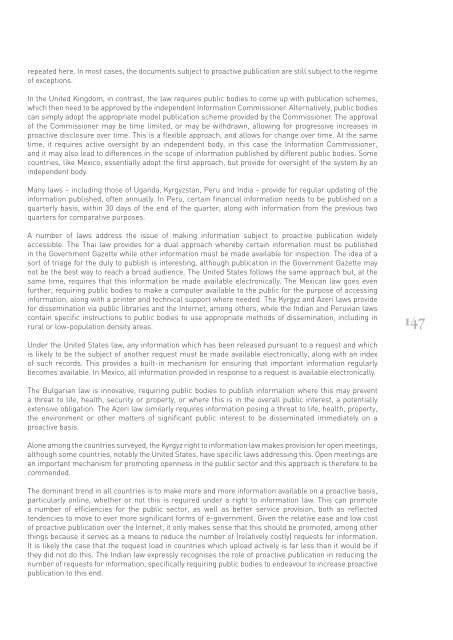Freedom of Information: A Comparative Legal Survey - Federation of ...
Freedom of Information: A Comparative Legal Survey - Federation of ...
Freedom of Information: A Comparative Legal Survey - Federation of ...
Create successful ePaper yourself
Turn your PDF publications into a flip-book with our unique Google optimized e-Paper software.
epeated here. In most cases, the documents subject to proactive publication are still subject to the regime<br />
<strong>of</strong> exceptions.<br />
In the United Kingdom, in contrast, the law requires public bodies to come up with publication schemes,<br />
which then need to be approved by the independent <strong>Information</strong> Commissioner. Alternatively, public bodies<br />
can simply adopt the appropriate model publication scheme provided by the Commissioner. The approval<br />
<strong>of</strong> the Commissioner may be time limited, or may be withdrawn, allowing for progressive increases in<br />
proactive disclosure over time. This is a fl exible approach, and allows for change over time. At the same<br />
time, it requires active oversight by an independent body, in this case the <strong>Information</strong> Commissioner,<br />
and it may also lead to differences in the scope <strong>of</strong> information published by different public bodies. Some<br />
countries, like Mexico, essentially adopt the fi rst approach, but provide for oversight <strong>of</strong> the system by an<br />
independent body.<br />
Many laws – including those <strong>of</strong> Uganda, Kyrgyzstan, Peru and India – provide for regular updating <strong>of</strong> the<br />
information published, <strong>of</strong>ten annually. In Peru, certain fi nancial information needs to be published on a<br />
quarterly basis, within 30 days <strong>of</strong> the end <strong>of</strong> the quarter, along with information from the previous two<br />
quarters for comparative purposes.<br />
A number <strong>of</strong> laws address the issue <strong>of</strong> making information subject to proactive publication widely<br />
accessible. The Thai law provides for a dual approach whereby certain information must be published<br />
in the Government Gazette while other information must be made available for inspection. The idea <strong>of</strong> a<br />
sort <strong>of</strong> triage for the duty to publish is interesting, although publication in the Government Gazette may<br />
not be the best way to reach a broad audience. The United States follows the same approach but, at the<br />
same time, requires that this information be made available electronically. The Mexican law goes even<br />
further, requiring public bodies to make a computer available to the public for the purpose <strong>of</strong> accessing<br />
information, along with a printer and technical support where needed. The Kyrgyz and Azeri laws provide<br />
for dissemination via public libraries and the Internet, among others, while the Indian and Peruvian laws<br />
contain specifi c instructions to public bodies to use appropriate methods <strong>of</strong> dissemination, including in<br />
rural or low-population density areas.<br />
Under the United States law, any information which has been released pursuant to a request and which<br />
is likely to be the subject <strong>of</strong> another request must be made available electronically, along with an index<br />
<strong>of</strong> such records. This provides a built-in mechanism for ensuring that important information regularly<br />
becomes available. In Mexico, all information provided in response to a request is available electronically.<br />
The Bulgarian law is innovative, requiring public bodies to publish information where this may prevent<br />
a threat to life, health, security or property, or where this is in the overall public interest, a potentially<br />
extensive obligation. The Azeri law similarly requires information posing a threat to life, health, property,<br />
the environment or other matters <strong>of</strong> signifi cant public interest to be disseminated immediately on a<br />
proactive basis.<br />
Alone among the countries surveyed, the Kyrgyz right to information law makes provision for open meetings,<br />
although some countries, notably the United States, have specifi c laws addressing this. Open meetings are<br />
an important mechanism for promoting openness in the public sector and this approach is therefore to be<br />
commended.<br />
The dominant trend in all countries is to make more and more information available on a proactive basis,<br />
particularly online, whether or not this is required under a right to information law. This can promote<br />
a number <strong>of</strong> effi ciencies for the public sector, as well as better service provision, both as refl ected<br />
tendencies to move to ever more signifi cant forms <strong>of</strong> e-government. Given the relative ease and low cost<br />
<strong>of</strong> proactive publication over the Internet, it only makes sense that this should be promoted, among other<br />
things because it serves as a means to reduce the number <strong>of</strong> (relatively costly) requests for information.<br />
It is likely the case that the request load in countries which upload actively is far less than it would be if<br />
they did not do this. The Indian law expressly recognises the role <strong>of</strong> proactive publication in reducing the<br />
number <strong>of</strong> requests for information, specifi cally requiring public bodies to endeavour to increase proactive<br />
publication to this end.<br />
147
















